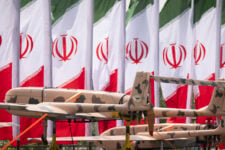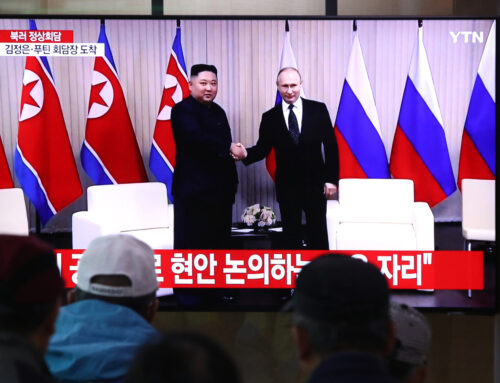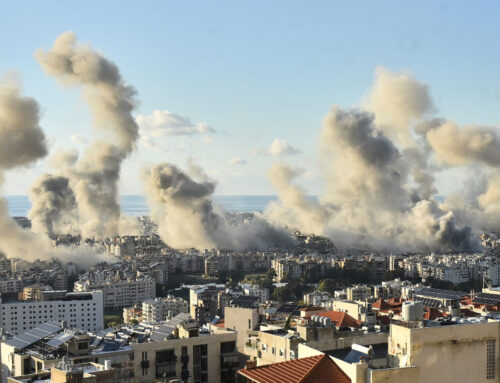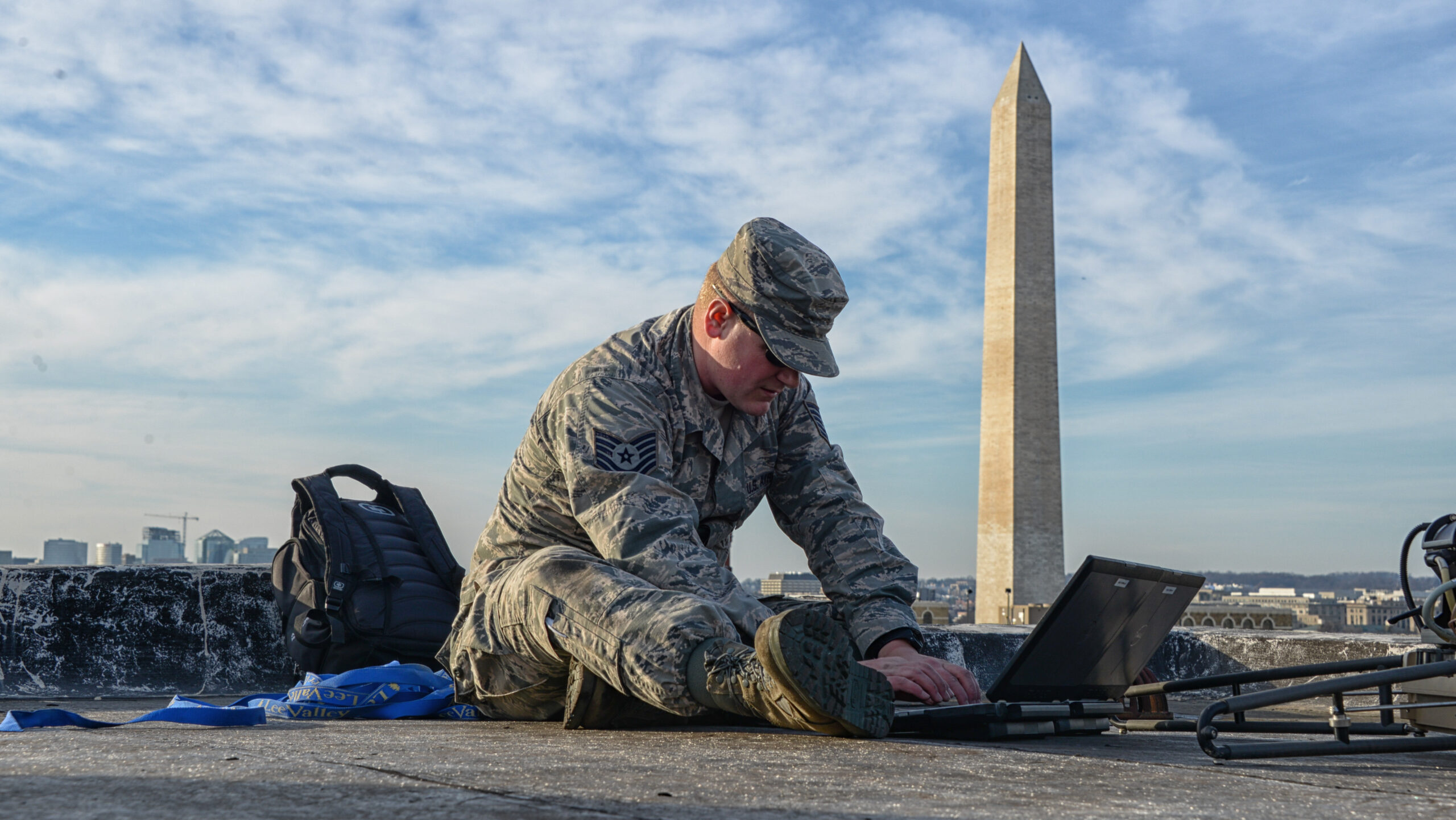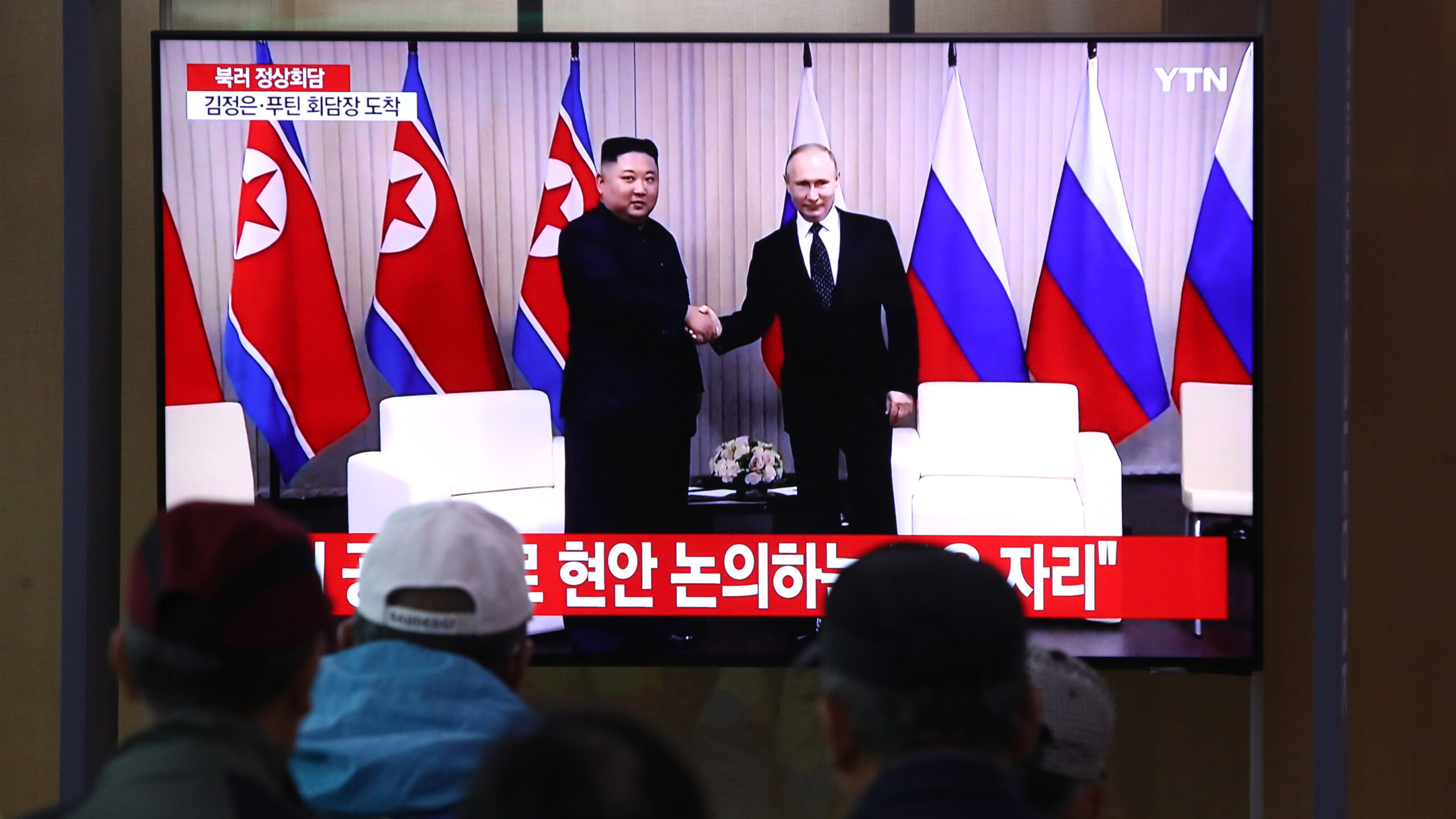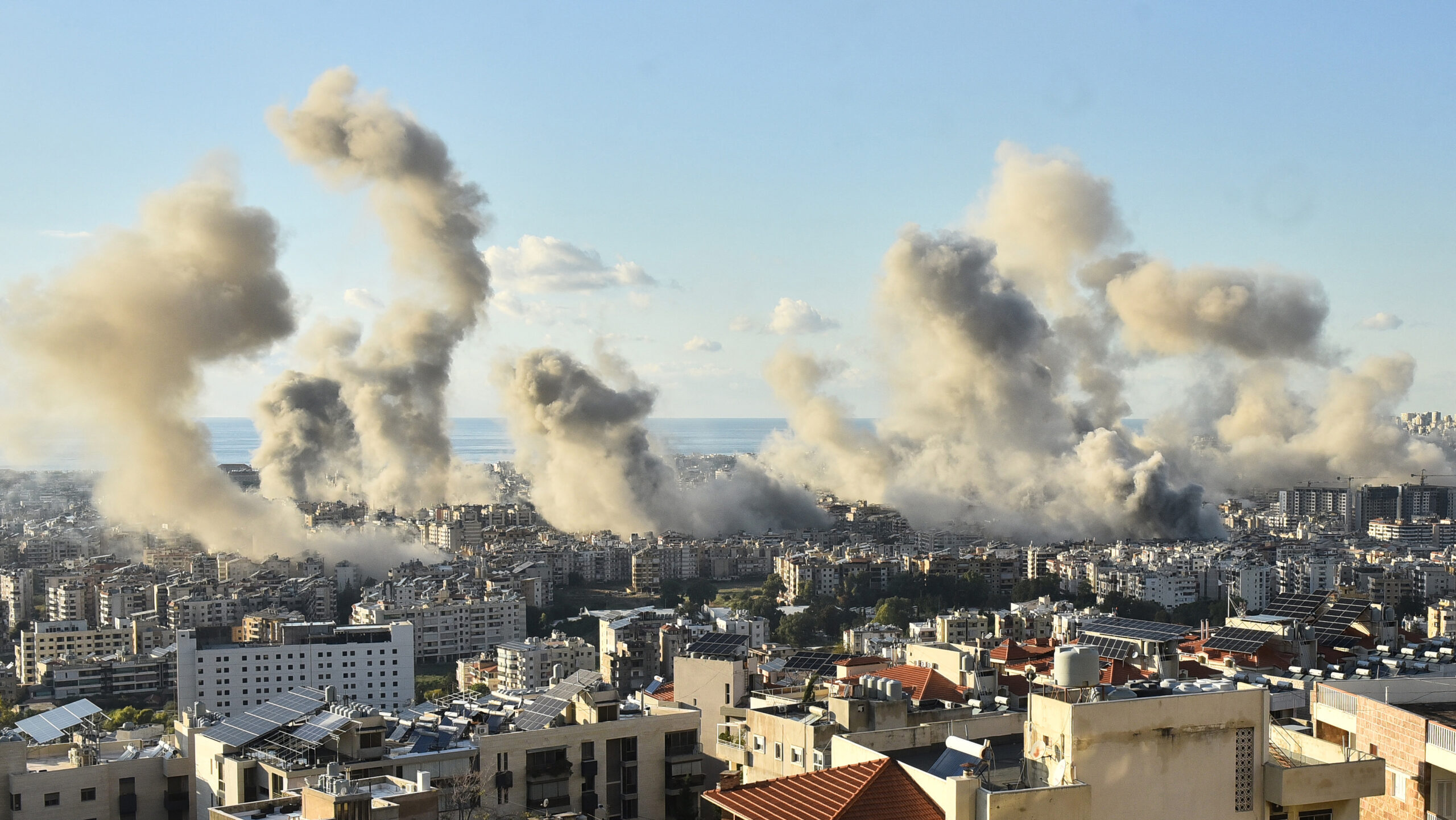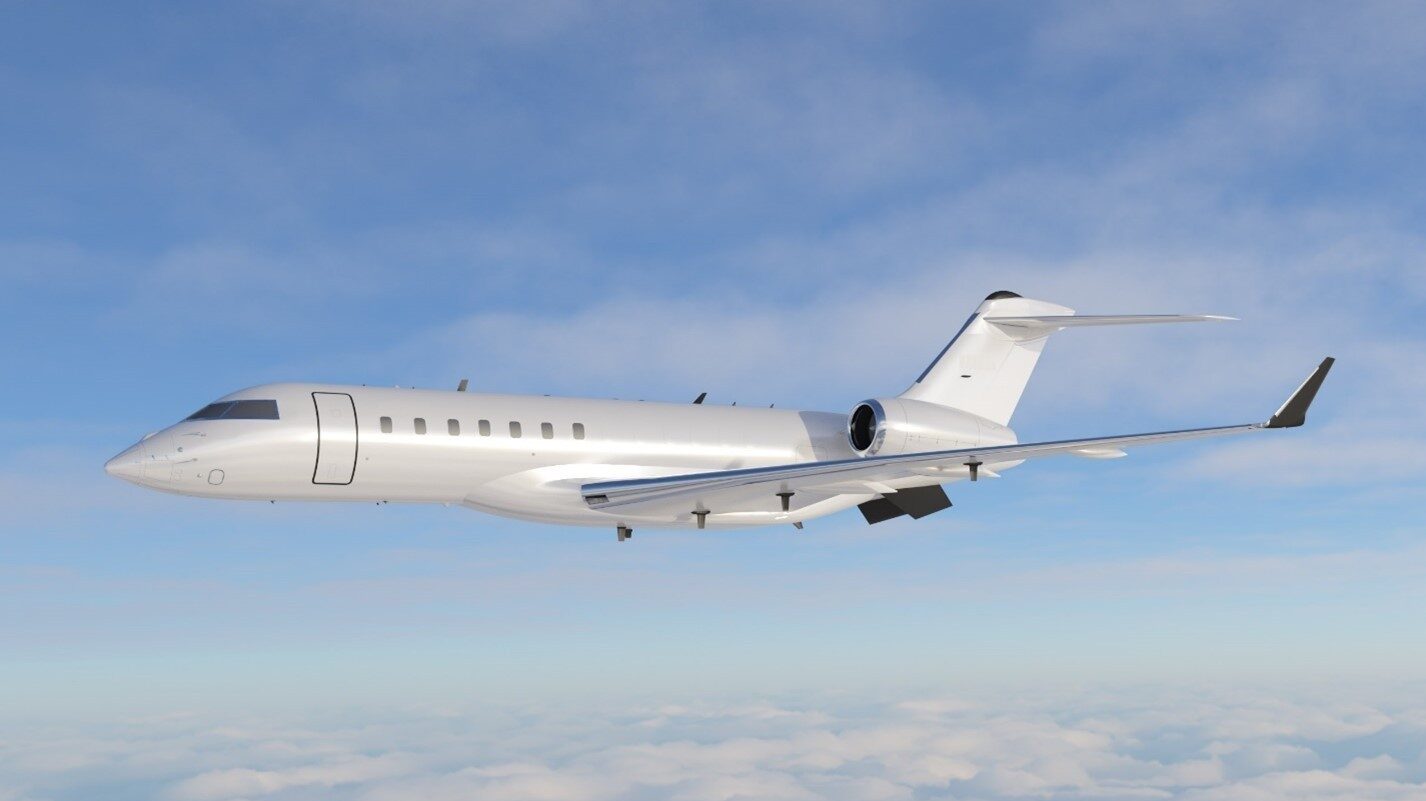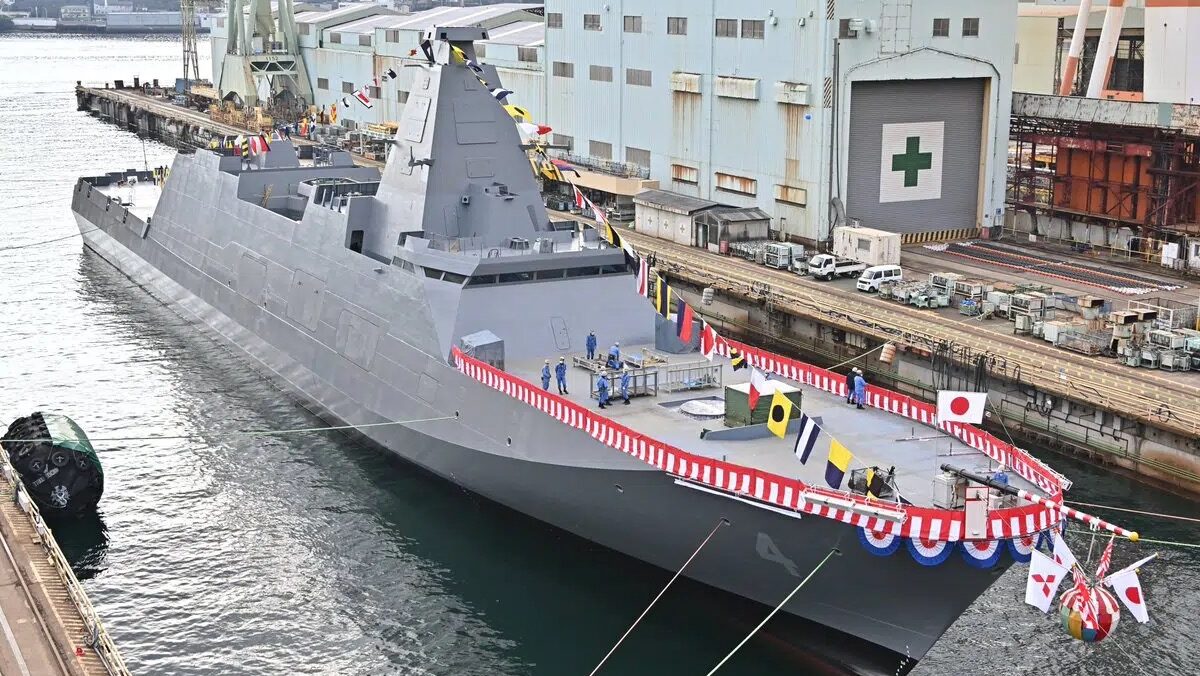A truck is carrying Iranian-made Unmanned Aerial Vehicles (UAVs) past Iranian flags during a military parade marking the anniversary of Iran’s Army Day at an Army military base in Tehran, Iran, on April 17, 2024. (Photo by Morteza Nikoubazl/NurPhoto via Getty Images)
DUBAI — Iran’s massive retaliatory strike against Israel may have failed to do any significant damage, but analysts tell Breaking Defense that the attack sent a clear message through the region: that Iran has a formidable arsenal, one capable of providing deterrence against any aggressive action.
The April 13 late night attack against Israel was a game changer for Iran in two ways. First, the sheer ferocity of the attack — launching 170 kamikaze drones, 30 cruise missiles and 110 ballistic missiles on multiple targets in a five-hour window — was unlike anything the region had seen from Tehran before. And second, it seems to signal a new phase for Iran, as the decades long “shadow war” between Tehran and Jerusalem has escalated into open conflict.
“Iran chose to put on a powerful yet calibrated show of force in response to Israel’s attack on its consulate,” said Hasan Alhasan, senior fellow at the International Institute for Strategic Studies. “Iran’s goal was to restore its credibility and inflict retribution on Israel while reducing the risk of further escalation.”
The United States, along with Britain and France, deployed jet fighters and other naval and air defense assets that assisted Israel in intercepting the Iranian drones and missiles. While the vast majority of Iranian threats were intercepted and almost no damage occurred inside Israel, other regional players lack the kind of deep air defenses Israel has built up over time, and may not feel they can count on Washington or London to provide the same kind of aid.
“For other countries in the region, the Iranian attack on Israel is a preview of the nightmare scenario involved in a direct confrontation with Iran,” Alhasan told Breaking Defense. “Whereas Israel has the capabilities and Western support it needs to intercept most of Iran’s missiles and UAVs, other states in the region (which are less capable and geographically closer to Iran) do not.”
RELATED: After shooting down Iranian munitions, Jordan defiant in uncomfortable spotlight
Masoud Alfak, a Dubai-based expert and analyst specialized in Iranian affairs, concurred, telling Breaking Defense that “This attack has sparked concerns among neighboring countries lacking Israel’s robust deterrent capabilities. Iran’s actions has demonstrated to regional states its ability to employ a combination of missile strikes, drone attacks, and cyber warfare, demonstrating a multifaceted approach to conflict.”
Alex Vatanka, the founding director of the Iran program at the Middle East Institute in Washington, said that even though little damage was done to Israel — and that half the ballistic missiles launched by Iran reportedly appear to have failed to launch — Iran’s action put should put everyone on notice
“The size of Iran’s arsenal and the precision of its drones and missiles are only going to improve. That is not good news for Israel or anyone in the region that might be a target for Iran in the future,” said Vatanka.
Not everyone is convinced. Ken Katzman, a senior fellow at the Soufan Center, told Breaking Defense that “The attack significantly set back Iran’s emergence as a major regional power. The core of Iran’s strategic power, its missile and drone arsenal, were proven failures against sophisticated air and missile defense systems. … The regime did not establish deterrence against Israel, the United States, and other regional players.”
But other experts counter that Iran likely had set up the attack specifically to avoid doing any real damage and hence escalating into a true conflict with Israel.
“Iran was not trying to inflict significant damage, given how it worked with the US to give ample warning of the attack, and how it deliberately chose slow projectiles to give everyone enough time to prepare and shoot them down,” said Dina Esfandiary, senior advisor Middle East and North Africa at the International Crisis Group. “But generally, their attack was just intended to send the message that Iran can reach all the way into Israel if it wanted to.”
RELATED: Israeli F-35s were targeted in Iranian barrage but survived unscathed, IDF says
Alhasan agreed, adding that, “Iran likely intended to minimise the damage from its attack by telegraphing its intentions in advance.”
Iranian Foreign Minister Hussein Amirabdollahian told reporters a day after the strike that Tehran contacted many players, including the United States, alerting them to Iran’s intentions of attacking Israel and reasserting its position on avoiding escalation regionally; the US has denied having any direct contact with Iran. (This may be an academic difference, as both sides seem to agree Iran notified a number of local nations of its intent, and Tehran would have known that would serve as a back channel to both the US and Israel.)
Out Of The Shadows
The question now is whether Iran has opened the floodgates to a different kind of tension in the region: putting open war between Israel and Iran, rather than the “shadow war” of decades, on the table.
“It is going to be hard to go back to the era of ‘war in the shadows’ now that this fight is in the open,” Vatanka told Breaking Defense. “The fact that they went ahead and did this shows the regime in Tehran can be as crazy as they say they are.”
The Crisis Group’s senior Iran analyst Naysan Rafati pointed out that “the Iranian side is mostly focused around the fact that they took an unprecedented step of striking against Israel overtly — a notable break from their decades-long strategy of building up allies along Israel’s borders and working indirectly through them.”
Rafati told Breaking Defense that “the key takeaway is probably that within the Iranian system, those who argue for more aggressive and high-risk actions clearly have the upper hand,” which is driving global concern of a major escalation in the conflict.
What comes next is uncertain. The US reportedly has told Israeli Prime Minister Benjamin Netanyahu not to escalate further. However, members of Netanyahu’s cabinet have stated that they will have to respond.
The only thing that is clear: Regional players are watching, and watching closely, not only for what Israel will do but how the US and its allies will react.
In that regard, the US may have received one ancillary boost from this weekend’s activity: Other powers like Saudi Arabia or the UAE may feel they can trust the American missile defense umbrella again, following the erosion of confidence between Washington and its major Arab Gulf allies after the US failed to stop an attack by drones and cruise missiles fired by the Iranian-backed Houthi militias in Yemen against Saudi oil facilities in 2019.
Katzman told Breaking Defense that by spearheading the aerial defense to protect Israel from the Iranian drones the United States has made major advances towards regaining “the regional trust and confidence in the U.S. commitment to the region’s stability.”


